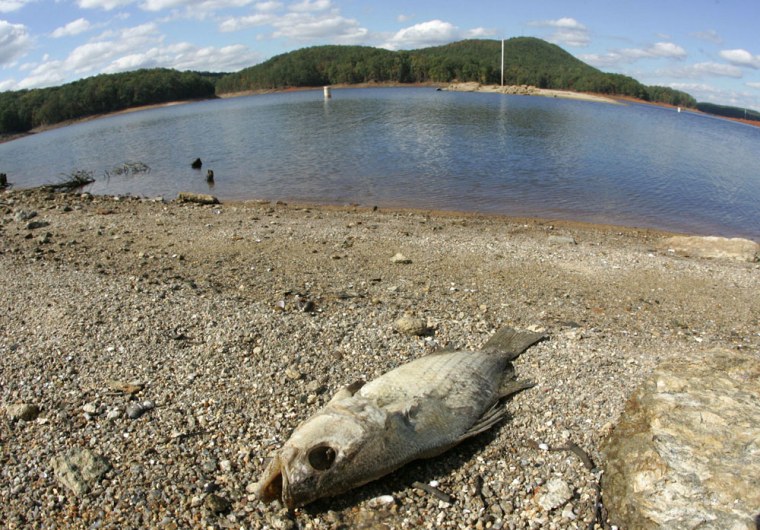Residents of Dade County have spent much of their history feeling ignored by the rest the state. For decades people had to cut through Alabama or Tennessee to get to the county in the northwest corner of Georgia, and some residents still get key services from out of state. It even got left off the state quarter.
"We always seem to be an afterthought," says Ben Brandon, the county's chief executive.
But the county of 16,000 is finally getting some attention thanks to a historic drought — and the fact that it's the only part of Georgia that's a stone's throw from the massive Tennessee River.
Lawmakers in drought-stricken Georgia have empowered the governor to sue to correct a flawed 1818 survey that mistakenly placed Georgia's northern line just short of the Tennessee River, which boasts a flow about 15 times greater than the one Atlanta depends on for water.
Meanwhile, other politicians have suggested doing a little horse trading for the big water rights: Georgia could swap a high-speed rail line link to Chattanooga in exchange for access to the river.
Either way, Dade County's tantalizing proximity to the river figures to give the county a prominent role in the negotiations.
County leaders are already putting plans in motion. They signed an agreement with a water firm in 2005 to begin scouting possible locations for a pumping station in Dade County and a potential pipeline route to supply parched north Georgia.
Tennessee officials have mocked Georgia's efforts and even quipped they would take up arms in self-defense.
If Georgia fails in its long-shot bid to move the state line, engineers are also preparing a backup plan to tap the aquifers underlying the region around the river.
Rural backwater no more
Water negotiations could bring changes to this rural backwater, where the quickest route from Atlanta still runs through Tennessee and residents wear their independence as a badge of honor.
"I've always enjoyed growing up here. Being cut off from the rest of the state didn't bother me at all," says Larry Case, a 59-year-old who owns Case Hardware Store on the town square.
"We kind of had a county of our own and did our own thing," he says. "It's probably because of the geographic area. It was so hard to get anywhere else, we became that way. They tell me the area was settled by horse thieves and criminals and they didn't want interference up here."
Founded in 1837, the county was initially dotted with families who toiled in coal mines and others who won land lotteries to settle Georgia's northern reaches.
The "independent" label wasn't born until 1860, when the South inched toward Civil War. Locals say a state representative from Dade County, frustrated with the slow pace of secession, vowed that Dade all by itself would secede from the Union — and Georgia.
Historians have debunked the legend, but some county residents celebrate it as fact. The spirit of defiance lives on in the county's slogan: "The Independent State of Dade."
Lately, though, residents have wished for more attention from the rest of the state.
Brandon says Georgia's failure to declare the county a disaster area after a particularly strong storm 20 years ago led to an aborted modern-day movement to secede. And many were miffed by a recent currency oversight: A close look at the U.S. Mint's Georgia quarter reveals a missing corner where Dade County should be.
The county's main industry is manufacturing, and it is home to a growing number of retirees and hang gliders who seek the fresh mountain air and sweeping vistas.
Water as economic resource?
An economic downturn, though, has hit hard. County sales tax is down 20 percent since last year, says county clerk Don Townsend. It lends urgency to the hope of some residents that the water fight will revive the economy.
"Worst case scenario, you'd think you could drill a well and tap into the water source," says Eddy Gifford, who has owned the Dade County Sentinel for 24 years.
Getting to the section of Dade County closest to the Tennessee line takes a 20-minute drive from the county's seat in Trenton, around a bulbous mountain, through Tennessee and into a flat, grassy area where the river dips just a few feet north of the state line.
Residents nearest to the river don't get water, electricity or fire protection from Georgia. They rely mostly on Tennessee roads to go shopping. Police must drive the same 20-minute route from their headquarters in Trenton, and school buses don't roam this neck of the woods.
"They don't have hardly anything — they don't even have dog catchers," quips Jerry Body, a 66-year-old Georgia resident whose mailing address is in Tennessee.
Like the rest of the county, though, Brandon says this neglected stretch could one day be one of Georgia's most important plots of land.
"You can say what you want, but in the end you know what the intent was when they drew the lines: to give Georgia access to the Tennessee River," he says.
